Australia’s Indigenous culture is celebrated in the AFL this weekend, and on centre stage at the MCG this Saturday night. Through football and Richmond, Tahlia Biggs, a young Aboriginal woman from Albury, is making her way in the big city, and helping make a better world.
Tahlia Biggs, 20, Clayton (via Albury)
Favourite Richmond player
Shane Edwards and Daniel Rioli - “I first met Shane when he spoke to a group of us at KGI and I’ve seen him really take on a leadership role. Daniel is a similar age to me. They’re the two I can relate to the most.”
“I’ve always been surrounded by strong women,” says Tahlia Biggs, a young leader-in-the-making with her roots in the heart of country, and hopes of one day of reaching for the stars.
“In a lot of Aboriginal communities, it’s the aunties and the mothers and grandmothers who are the leaders of family, the matriarchs. Women run the communities.”
On a seat on high ground in Yarra Park, lorikeets chirping in gum treetops, the red Edwardian bricks of the old stand at Punt Road Oval below us, I meet a young woman who is remarkable and inspiring, and honest and vulnerable, and who in many ways is the future of Aboriginal Australia.
Her name is Tahlia Biggs, she is 20, was born Albury, has lived mostly in Wodonga, and her family is from Barkindji and Ngiyampaa country – or variously from the towns of Wilcannia and Cobar in western New South Wales. She moved to Melbourne a few months ago for a job at Richmond FC as a program coordinator for the Korin Gamadji Institute’s (KGI) REAL Program.
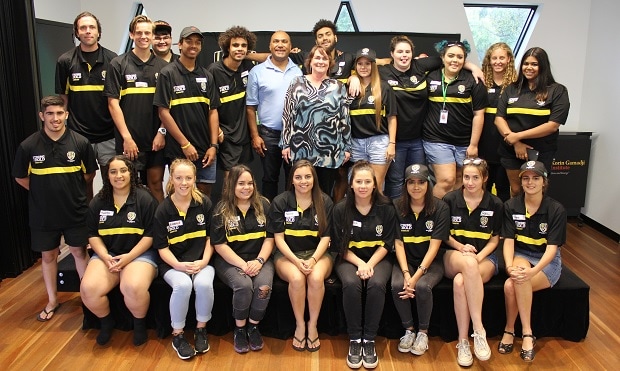
Korin Gamadji Institute’s REAL Program Phase 3 Leaders
“It’s my first adult job,” she says. “It’s my start as a leader in a bigger world.”
I’m curious about Tahlia because suburban Melbourne life rarely engages first-hand with Aboriginal Australia, and especially with its young people. At most, many of us read or hear about their plight, and the evidence – the truth – is a damning legacy. Indigenous Australians face an ongoing crisis. Their life expectancy is about 10 years less than for non-Indigenous Australians. Infant mortality rates (6.2 per 1000 live births) are almost double those of non-Indigenous children. Juvenile detention rates are 24 times higher. Hospitalisation rates for family violence-related assault are 32.8 times higher. Suicide, literacy, mental health, education, poverty – on almost every index the well-being of this land’s original custodians is an open wound.
“It’s not a hopeless situation, it’s not,” says Tahlia.
“A lot of Australians think that just throwing money at the problem is not going to solve it. And it’s true, if you’ve got a cut on your hand and you put a dollar note on it, it’s not going to heal it. The key to everything is education.”
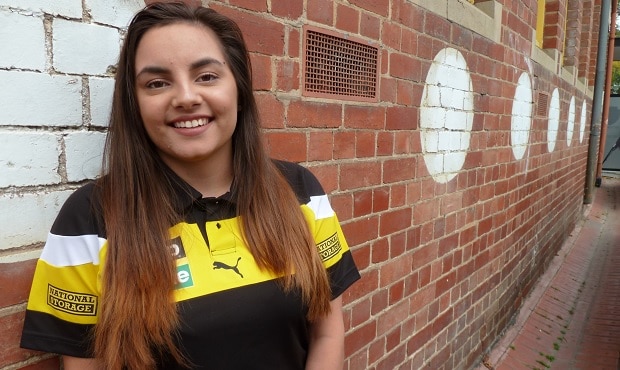
Tahlia Biggs: "So many before us haven’t had the chance to share our voice".
Enter football, and Richmond, and events like Dreamtime at the G.
Indigenous Australians comprise about 2.5 per cent of the nation’s population, yet contribute about 9 per cent of players on AFL lists. The game is a common language. All can shine. The field is more level than in most other arenas of life. Young men from the Noongar nation, from the Yorta Yorta, the Palawa, Narangga, Warray, Wangkathaa, and the Tiwi, among others, have become household names, and mentors for so many.
“I’ve heard it said, the AFL commodifies Aboriginal culture,” says Tahlia. “It might be true, but the MCG is a place where the Wurundjeri people have always held ceremonies. This land has their spirits. It’s great that Richmond are bringing back those war cries, that Aboriginal culture is still being practiced on the ground.”
“Football can be a starting point,” she says. “Richmond fans are so positive about what Shane Edwards and Daniel Rioli do, how they contribute. Once these fans take a bit of interest in their stories, about where they’ve come from and the disadvantages they’ve faced, they can go a few steps further in understanding things like discrimination and racism.”
Listening to Tahlia talk, the resolve and inner confidence she has, it’s hard not to think of her as a success story in progress. A pathway has opened for her, and through diligence and bravery she’s taken it.
It all began, she says, six years ago when “Uncle Luke” (Luke Murray, Richmond’s Indigenous Community Engagement manager) visited her high school in Wodonga, inviting a group of Indigenous students to participate in a four-day REAL Program camp held at the footy club. Run through the KGI, the Richmond Emerging Aboriginal Leadership program is aimed at developing leadership skills and confidence among 14-to-17-year-olds, each selected for being role models within their school or community.
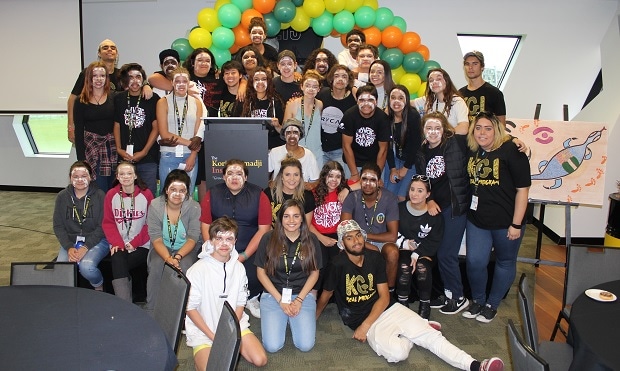
“I didn’t really know what being Aboriginal meant,” says Tahlia.
“My connection with my culture happened through KGI, coming down to Melbourne, to a completely different world, connecting with other Aboriginal young people and learning about leaders and role models.”
“Richmond gave me an opportunity to develop as a leader.”
Some might argue a professional football club should limit itself only to the business of fielding a football team. Might be true, might also be a missed opportunity. If Richmond, the football team, is made better by players such as ‘Titch’ Edwards and Dan Rioli – if the game is greater for the likes of ‘Buddy’ and Eddie and Cyril, Adam Goodes, the Krakoeur brothers, Maurice Rioli, and a long list of Indigenous champion players – why not harness this culture, give something back? Football, the AFL, Richmond, are all agents for change, for betterment, creating pathways that can only enrich us all. Through football, there is a bigger picture at play.
Tahlia Biggs is part of this. She talks about her life, about her mum and three younger sisters back in Albury, pangs of homesickness, about all the things she’s done. Volunteered for Cathy McGowan, the independent MP for Indi, in the Federal Parliament. Met with Linda Burney, the first Aboriginal woman to be elected to the House of Representatives (“She was great, she’s a lot like me, she’s short and she keeps her circle small but knows where she’s going”). And she’s overcome nerves and stood on the floor of State Parliament at a KGI Youth debate to advocate for her culture.
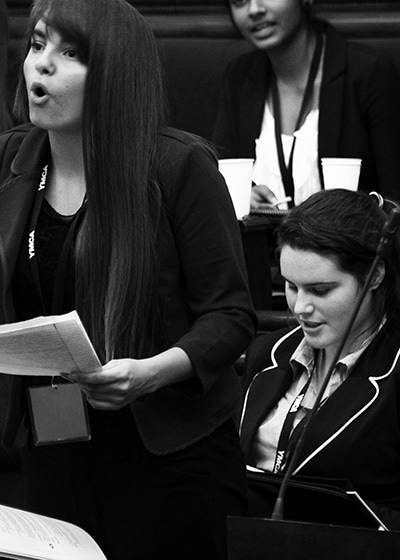
Sharing her voice: Tahlia Biggs on the floor of State Parliament.
“I was reminded at the time that so many before us haven’t had the chance to share our voice,” she says.
“Not many blackfellas have this opportunity. We need to use our voices to make up for all the times since colonisation that our voices, our culture, has been shut down.”
**
Two strangers in an open parkland, under leaden autumn skies, brought together by football and the community of Richmond, and the aura of Dreamtime at the G this Saturday night, and then there are tears, and a floor in a young woman’s world falls away.
Tahlia Biggs’ father died on December 18, 2014. He was in his early forties. She loved him dearly.
“I’ve come to realise we have so many problems in our community, It’s so sad” she says.
“I never thought it would hit my inner family so hard, until it did.”
The urge is to hug, console, offer support. As with so many of her role models, Tahlia has an inner strength, but none of us can do this alone. As with a football team, we need the support and help of others, of all those around us. We’re all in this together.
“One of my sisters messaged me the other day asking if I was OK,” she says.
“We share a music account so know what we’ve been listening to. She asked again if I was OK because she said I’ve been listening to a lot of country music and she says I only do that when I miss dad.”
**
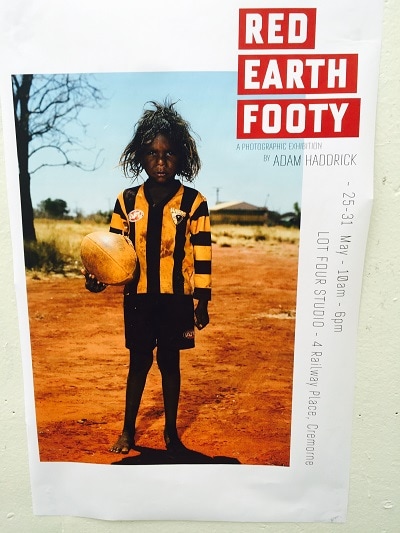
Riding my bicycle home, I can think only of Tahlia, of her opportunities, of what she’s had to overcome, of the young woman she is. In a subway under the railway tracks near the old Dimmey’s on Swan Street, there’s a poster for a photographic exhibition RED EARTH FOOTY – an arresting image of a young Aboriginal child clutching a football wearing Hawthorn colours – and it’s as if it’s a message of connection. The photographs are on display at Lot Four Studio, 4 Railway Place, in Richmond, to the 31 May. I must see them.
Before leaving, I said to Tahlia our lives will cross again. I said it might be on the television. One day, I said, I hope to point her out to my young boys, say ‘I know her’, say I sat beside her for an hour on a seat in a park above the Richmond footy ground, got teary-eyed with her, was inspired by her, met her when a new chapter of her life was just beginning.
And our footy club gave her a chance.
Our footy club opened-up her world.
Go Tiges!
And go ‘Titch’ and Dan on centre stage on Saturday night, dance around them all, make the ball sing – and may it be a night to remember.
If you would like to nominate a Richmond fan who has a story to tell about their barracking please email Dugald Jellie with details: dugaldjellie@gmail.com
www.tigertigerburningbright.com.au



